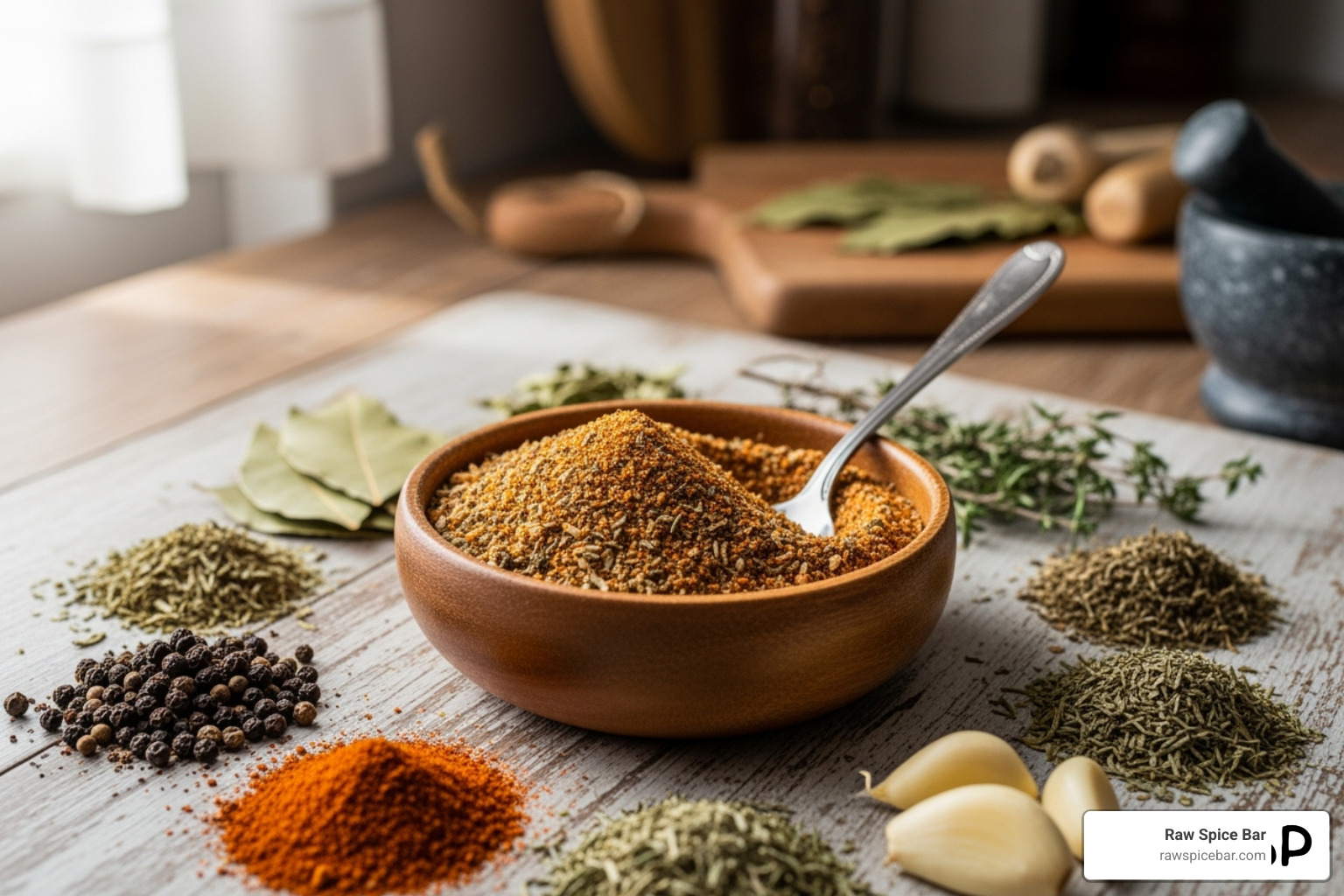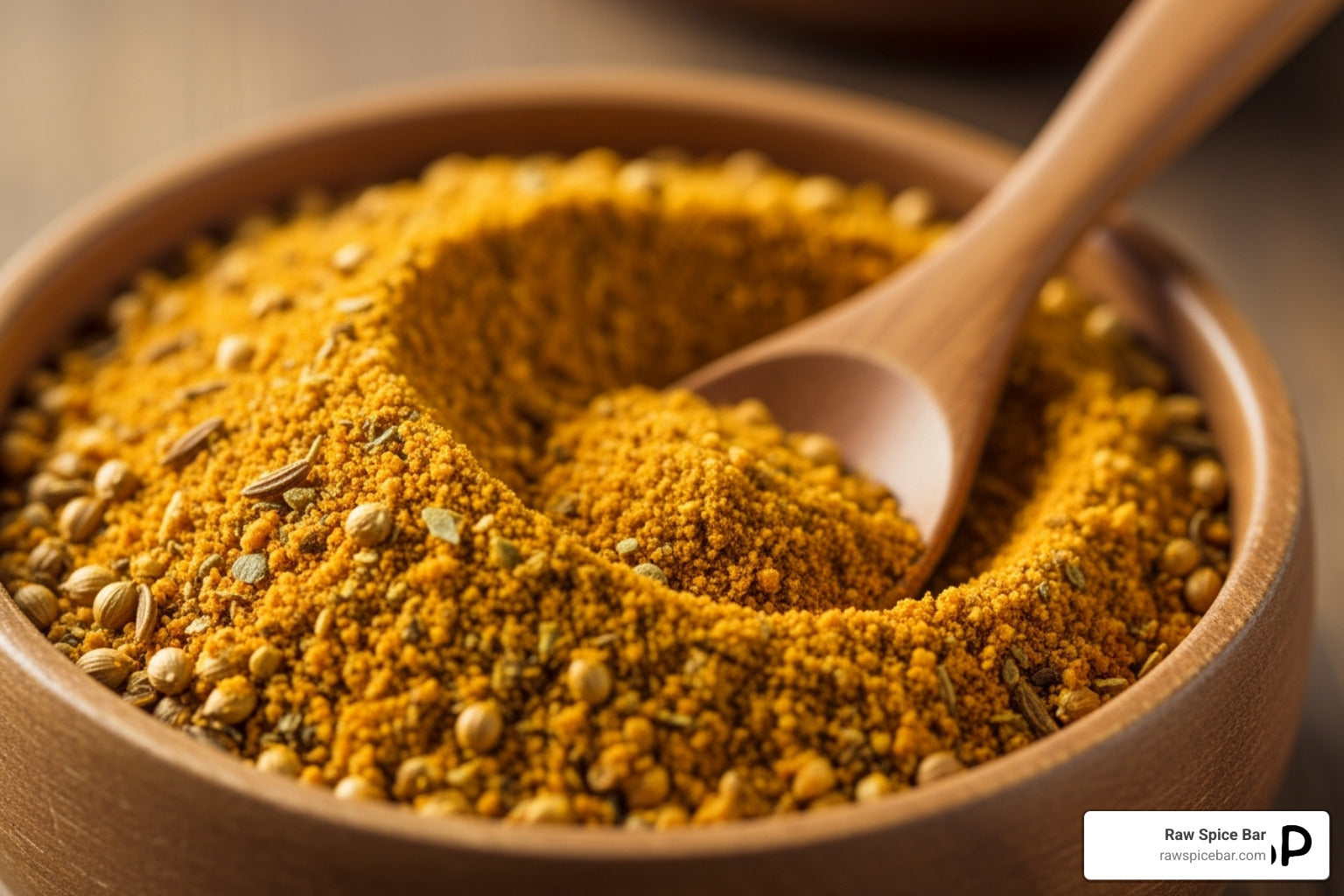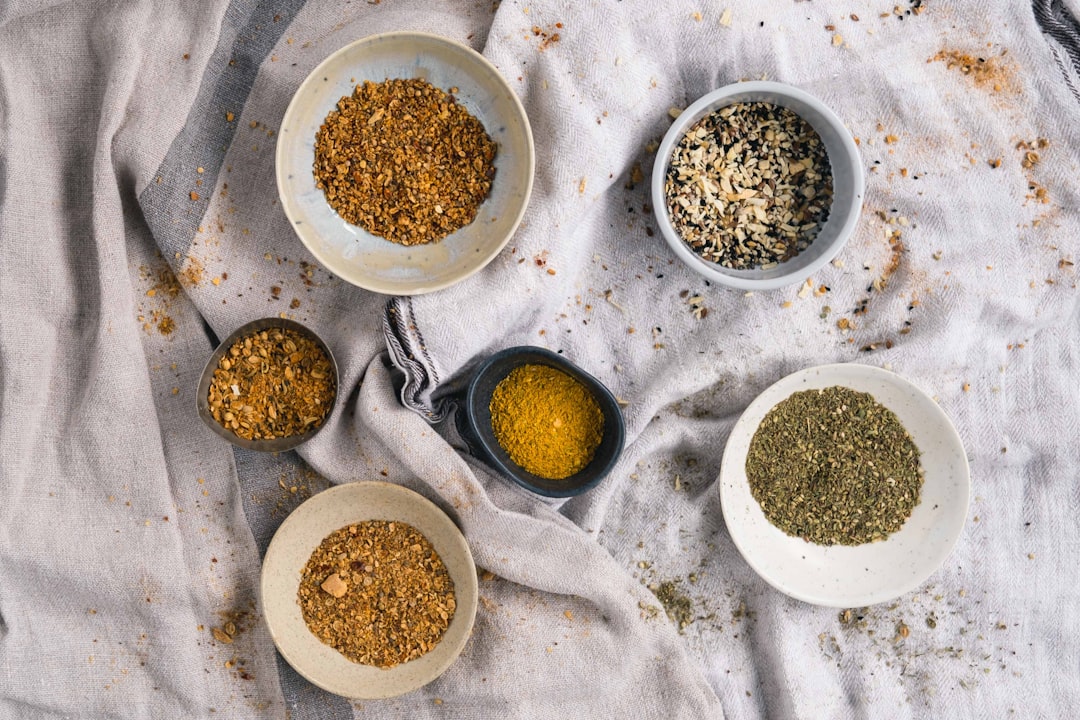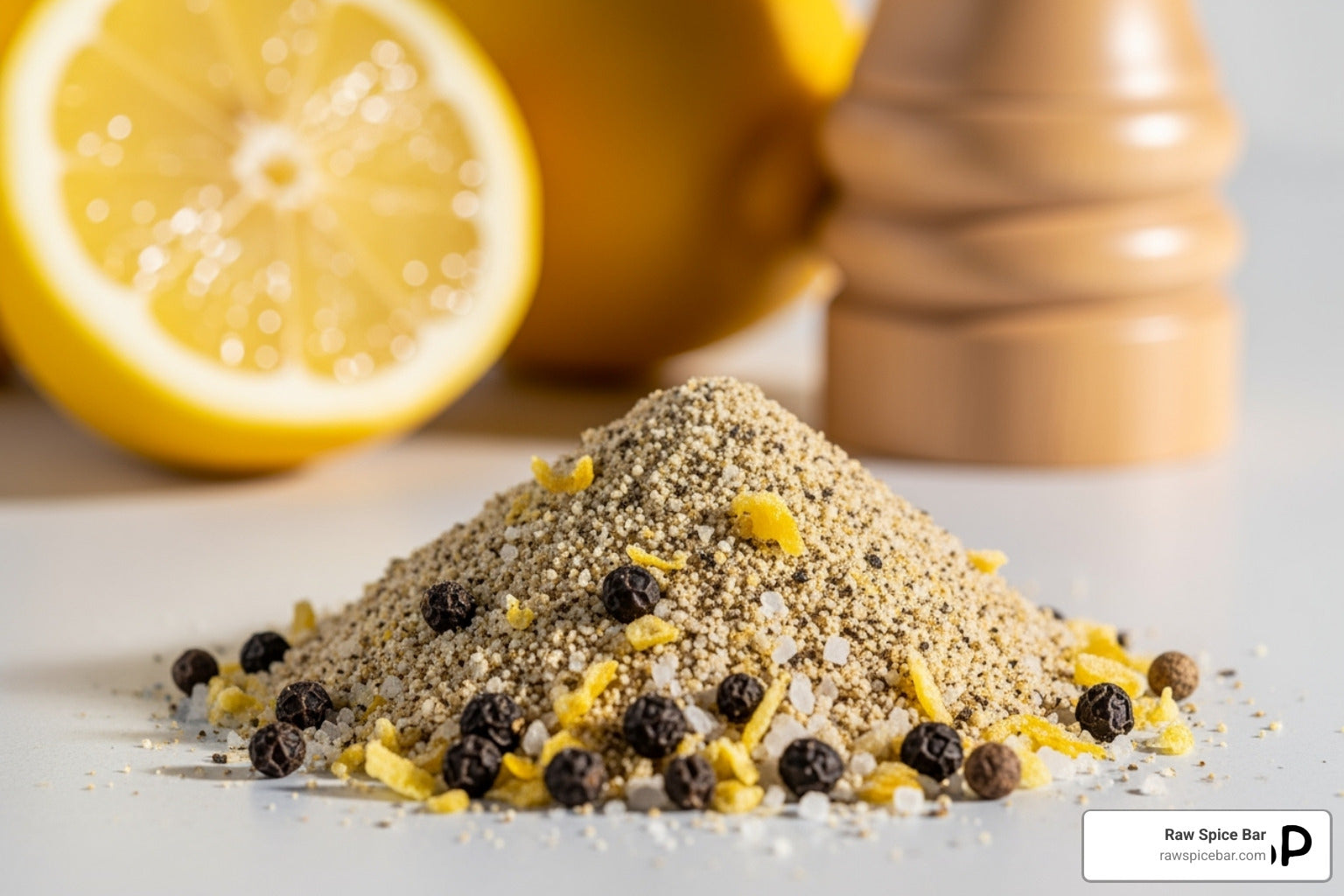Why Poultry Seasoning Substitutes Are a Game-Changer for Home Cooks
Finding the best poultry seasoning substitute can save your dinner when you're mid-recipe and realize your spice cabinet is missing this essential blend. The good news? You probably already have everything you need in your kitchen.
Quick Answer: Top Poultry Seasoning Substitutes
- Dried Sage + Thyme - Mix 2 parts sage to 1 part thyme
- Dried Sage Alone - Use half the amount called for in recipes
- Italian Seasoning - Use equal amounts as a 1:1 substitute
- Herbs de Provence - French blend works perfectly as 1:1 substitute
- Dried Thyme or Marjoram - Use half the amount of either herb
- Dried Rosemary - Use sparingly, about 1/4 the amount
- DIY Homemade Blend - Mix your own for the freshest flavor
Picture this: you're preparing your holiday turkey or Sunday roast chicken, and you reach for that little jar of poultry seasoning only to find it empty. Don't panic. As associate food editor Kellie Evans found when she "quit the bottle" of store-bought seasoning, making your own blend from fresh herbs and spices creates a "lively, pungent flavor that puts the jarred stuff to shame."
Most home cooks don't realize that poultry seasoning is simply a blend of common herbs you likely already own. The typical mix includes sage, thyme, rosemary, marjoram, nutmeg, and black pepper. When you understand this basic formula, creating substitutes becomes incredibly simple.
Whether you're out of seasoning, want to save money, or need to avoid certain ingredients, these alternatives will keep your kitchen running smoothly.
I'm Joseph Rosenblatt, founder of a premium spice company, and I've spent years helping home cooks find that the best poultry seasoning substitute often comes from understanding how individual spices work together. Through recipe development and global sourcing, I've learned that fresh, simple combinations usually outperform store-bought blends.
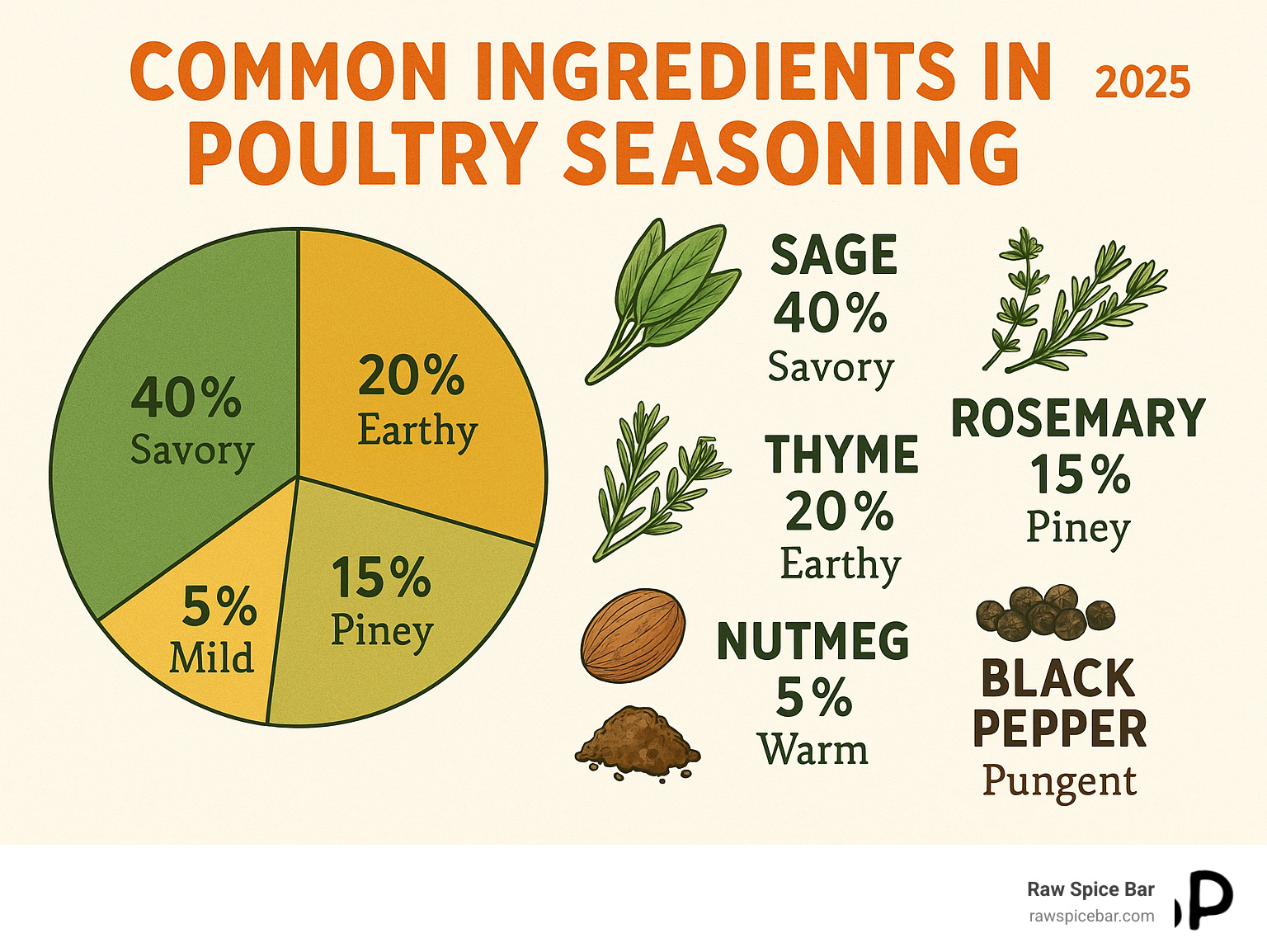
Best poultry seasoning substitute definitions:
What is Poultry Seasoning and Why Find a Substitute?
Understanding what poultry seasoning actually is makes finding the best poultry seasoning substitute much easier. Think of it as your kitchen's secret weapon for creating that warm, homey flavor we all associate with Sunday dinners and holiday feasts.
Poultry seasoning is simply a blend of dried herbs and spices designed to bring out the best in chicken, turkey, and other poultry. When you open a jar, you'll notice its earthy brown-green color and that distinctive sage-forward aroma that instantly reminds you of Thanksgiving dinner. The flavor profile hits all the right notes: earthy, savory, and aromatic with a complexity that transforms simple roast chicken into something special.
The magic happens when several key ingredients work together in harmony. Sage typically takes center stage, delivering that distinctive earthy, slightly peppery taste with subtle hints of mint and lemon. Thyme adds woody, floral notes that complement the sage beautifully, while rosemary contributes its signature pine-like aroma. Marjoram brings a gentler, more citrusy flavor than its cousin oregano, and nutmeg adds warmth with its subtly sweet, nutty undertone. Finally, black pepper or white pepper provides just enough heat to tie everything together.
Some blends get creative with additional ingredients like onion powder, garlic powder, or celery seed, but those core herbs form the foundation of any good poultry seasoning.
So why would you need alternatives? Life happens, and sometimes you find an empty spice jar right when you need it most. But there are other compelling reasons to explore substitutes.
Cost savings alone make homemade blends attractive - you can create your own for about a dollar compared to spending $8 to $10 on store-bought versions. That's real money back in your pocket, especially if you cook with poultry seasoning regularly.
Control over ingredients becomes important when you're dealing with dietary restrictions or simply prefer to know exactly what goes into your food. Commercial blends sometimes contain anti-caking agents or preservatives you'd rather avoid. Creating your own substitute means complete transparency.
Salt control matters too. Most poultry seasonings are salt-free, letting you control sodium levels in your cooking. When you use substitutes, you maintain this flexibility and avoid accidentally over-salting your carefully prepared meal.
Flavor customization opens up exciting possibilities. Maybe you prefer more thyme and less sage, or perhaps you want to add a touch of heat with cayenne. Substitutes give you the freedom to adjust ratios until you find your perfect blend.
Here's something important to remember: don't confuse poultry seasoning with poultry flavoring or bouillon. Poultry seasoning is a dry herb blend, while poultry flavoring refers to concentrated pastes or cubes that are often very salty and contain dehydrated chicken stock. They serve completely different purposes and aren't interchangeable in recipes.
Ready to find which pantry staples can save your dinner? For more insights into how spice blends work their magic, check out more info about spice blends.
Our Top 7 Picks for the Best Poultry Seasoning Substitute
The beauty of finding the best poultry seasoning substitute lies in simplicity. Most alternatives are probably sitting in your spice cabinet right now, waiting to save your dinner. These pantry staples can transform into perfect substitutes with the right ratios and a little kitchen confidence.
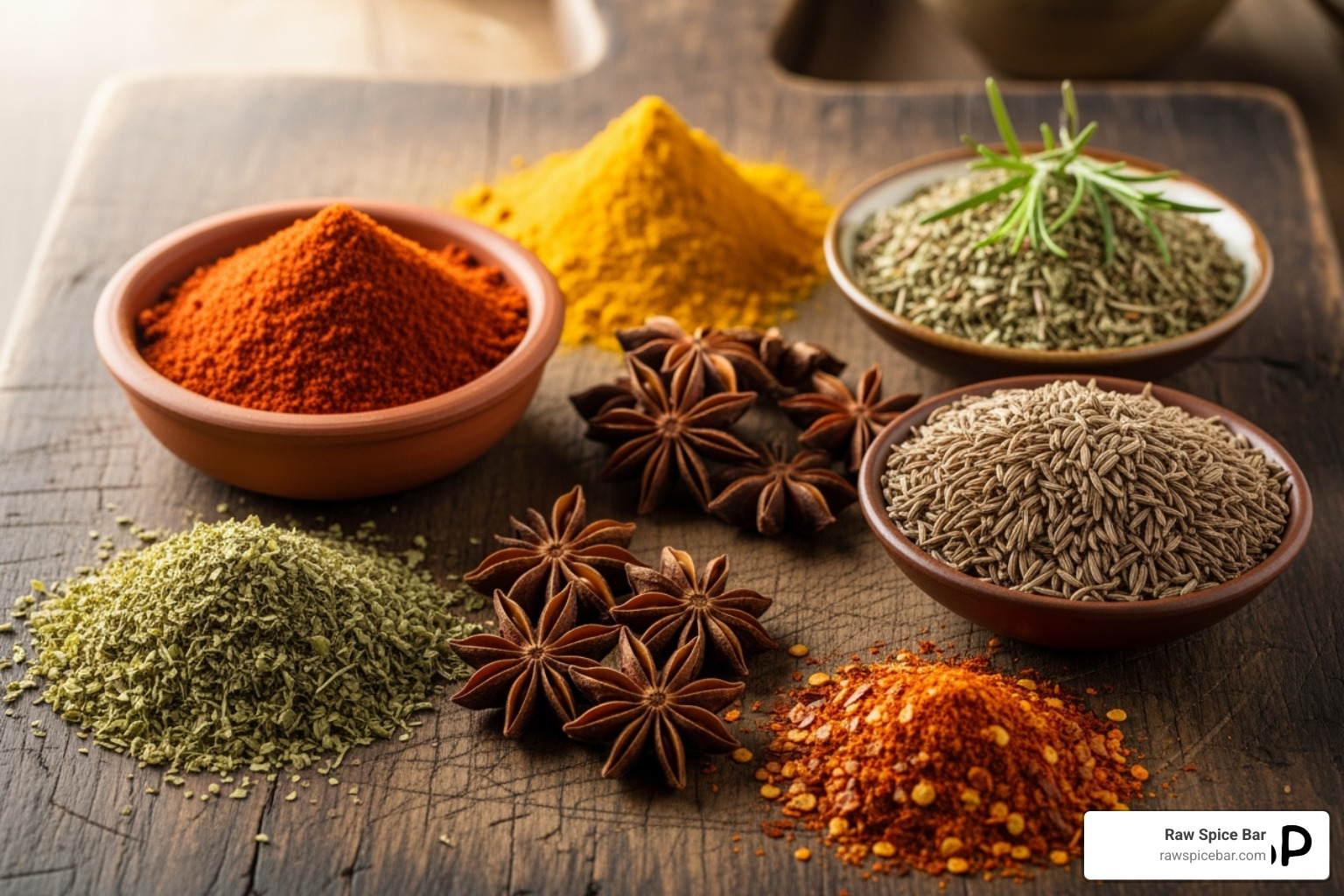
1. The Classic Combo: Dried Sage & Thyme
Think of sage and thyme as the dynamic duo of poultry seasoning. These two herbs form the backbone of most traditional blends, delivering that familiar, comforting flavor we associate with Sunday dinners and holiday feasts.
When you combine dried sage with dried thyme (and a pinch of dried marjoram if you have it), you're essentially recreating the heart of commercial poultry seasoning. The sage brings that earthy, slightly peppery note, while thyme adds woody depth.
The magic ratio: Mix 2 parts sage to 1 part thyme. So if your recipe calls for 1 tablespoon of poultry seasoning, use 2 teaspoons dried sage and 1 teaspoon dried thyme. This classic flavor profile will make your kitchen smell like Thanksgiving morning.
2. Dried Sage: The Best Poultry Seasoning Substitute for a Classic Flavor
Sometimes the simplest solution is the best one. Dried sage alone makes an excellent substitute because it's the star ingredient in most poultry seasonings anyway. Whether you use rubbed sage or ground sage, you'll capture that distinctive earthy flavor with peppery notes and subtle mint hints that defines traditional poultry dishes.
The key is knowing that sage packs a punch. Its robust flavor means a little goes a long way, which actually works in your favor when substituting.
Use half the amount of dried sage as the recipe calls for in poultry seasoning. If you need 1 tablespoon of poultry seasoning, start with 1/2 tablespoon of sage and taste as you go. For more sage alternatives and cooking tips, check out Exploring Savory Alternatives: A Comprehensive Guide to Sage Leaf Substitutes.
3. Dried Thyme or Marjoram
While sage gets most of the glory, dried thyme is the reliable supporting actor that makes poultry seasoning work so well. Its woody, slightly citrusy flavor complements poultry beautifully without overwhelming other ingredients.
Dried marjoram offers a similar but more delicate profile - it's floral and citrusy with a fresh, almost sweet quality. If you're out of marjoram, oregano works as a substitute, though it's stronger, so use about half the amount.
The substitution is simple: Use about half the amount of either dried thyme or marjoram as you would poultry seasoning. These herbs are potent enough to carry the flavor on their own, and their woody, aromatic qualities will still give your dish that classic poultry seasoning taste.
4. Aromatic Rosemary
Dried rosemary brings something special to the table with its distinctive woodsy flavor and pine notes. It's that herb that instantly makes your kitchen smell like a cozy cabin in the woods. While not the dominant flavor in most poultry seasonings, rosemary adds an aromatic complexity that lifts any dish.
The trick with rosemary is restraint. Its bold, almost resinous flavor can easily overpower more delicate ingredients if you're heavy-handed.
Use sparingly - about 1/4 the amount of dried rosemary as you would poultry seasoning. If using whole rosemary needles, crush them first for better distribution. Crushed rosemary integrates much better than whole needles, which can be tough and unpleasant to bite into.
5. Italian-Inspired Herb Blend
Here's where your everyday pantry becomes your hero. Italian seasoning is one of the most accessible substitutes because most home cooks already have it on hand. This common blend typically includes oregano, basil, thyme, and rosemary - ingredients that overlap beautifully with poultry seasoning.
The main difference is that Italian seasoning is less sage-forward, which actually works perfectly if you prefer a milder, more Mediterranean flavor profile. Your chicken will taste fantastic, just with a slightly different personality.
This is beautifully simple: Use Italian seasoning as a 1:1 substitution for poultry seasoning. No math, no measuring adjustments - just swap them out equally and enjoy the delicious results.
6. French-Inspired Herb Blend
French-style spice blends like Herbs de Provence offer a neat twist on traditional poultry seasoning. These sophisticated blends typically feature savory, marjoram, rosemary, thyme, and oregano, with some versions including a touch of lavender for floral complexity.
The beauty of French herb blends lies in their balanced complexity. They provide the same aromatic, herbaceous quality as poultry seasoning but with a more refined, European flair.
Keep it simple: Use your French herb blend as a 1:1 substitution for poultry seasoning. The flavor profile is close enough that you won't need to adjust quantities, and your poultry will have a lovely, sophisticated taste that might just become your new favorite.
7. The Ultimate DIY Blend: Your Own Homemade Poultry Seasoning
The absolute best poultry seasoning substitute is the one you create yourself. Making your own homemade blend gives you the freshest option with full control over every ingredient. Plus, you can customize it to your exact taste preferences - more sage, less pepper, whatever makes your taste buds happy.
Creating your own blend isn't just practical; it's empowering. You'll know exactly what goes into your food, control the salt content, and save money in the process. Ready to become your own spice master? Let's explore the detailed recipe that will change how you think about seasoning forever.
How to Make the Perfect Homemade Poultry Seasoning
Making your own poultry seasoning from scratch is not only empowering but also yields a superior product. As we often say, freshly ground spices make all the difference, offering a "lively, pungent flavor" that store-bought versions simply can't match.
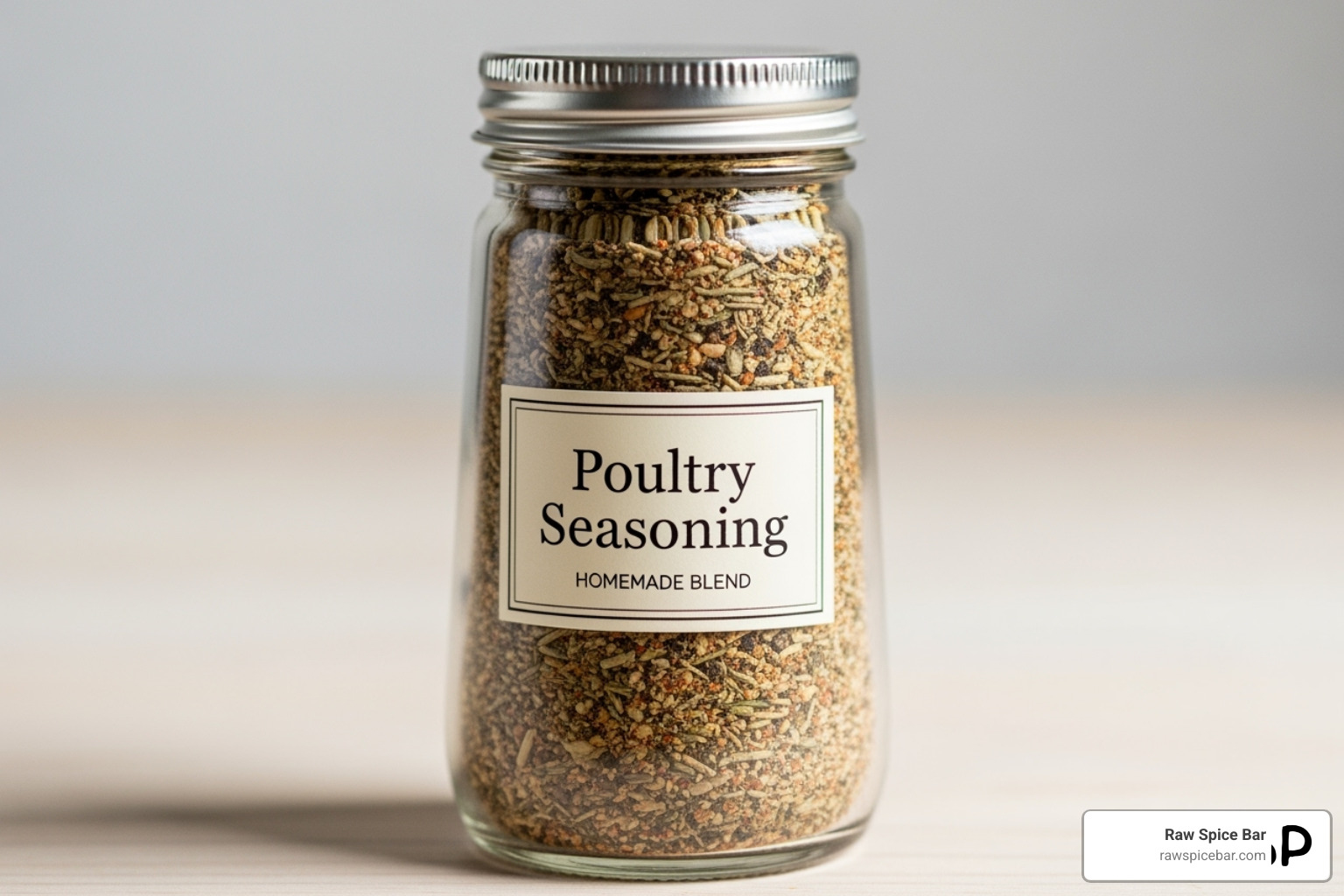
Why do freshly ground spices make such a difference? Because the aromatic compounds that give spices their flavor begin to degrade the moment they are ground. Pre-ground spices, sitting on a shelf, lose their potency over time. When you grind your own, you open up their full, vibrant essence. This means a cleaner, fresher taste for your dishes. For a deeper dive into this, check out Why Freshly Ground Spices Make a Difference.
Let's compare a typical homemade recipe with a store-bought version:
| Feature | Homemade Poultry Seasoning | Store-Bought Poultry Seasoning |
|---|---|---|
| Ingredients | Dried sage, thyme, marjoram, rosemary, nutmeg, white pepper, optional additions | Thyme, sage, marjoram, rosemary, black pepper, nutmeg |
| Cost (approx.) | ~$1.00 per batch (equivalent to a jar) | $8.00 - $10.00 per jar |
| Freshness | Made fresh, vibrant flavor | Can be stale, less potent |
| Additives | None | May contain anti-caking agents, preservatives |
| Salt Content | Inherently salt-free (you control salt) | Typically salt-free, but check label |
| Customization | Full control over ratios and additions | Fixed blend |
The Ultimate Homemade Poultry Seasoning Recipe
Here's our go-to recipe for a robust and flavorful homemade poultry seasoning that will put store-bought versions to shame:
Yields: Approximately 3 tablespoons Prep time: 5 minutes
Ingredients:
- 2 teaspoons ground sage (or rubbed sage, which is coarser)
- 1 1/2 teaspoons dried thyme
- 1 teaspoon dried marjoram
- 1 teaspoon dried crushed rosemary (important for better blending, chop full needles if needed)
- 1/2 teaspoon ground white pepper (for authentic flavor, though black pepper works too)
- 1/4 teaspoon ground nutmeg
- 1/4 teaspoon black pepper (if not using white pepper, or for extra kick)
Optional Additions (adjust to taste):
- 1/2 teaspoon onion powder
- 1/2 teaspoon garlic powder
- 1/4 teaspoon celery seed
- 1/4 teaspoon paprika (for color and mild flavor)
- Pinch of cayenne pepper (for a subtle heat)
- Pinch of ground ginger or dried lemon peel
Instructions:
- Gather Your Spices: Ensure all your dried herbs and spices are fresh and aromatic. Give them a sniff – if they don't have much aroma, it's time to replace them.
- Combine Ingredients: In a small bowl, whisk together all the listed ingredients until they are evenly combined.
- Grind for Fineness (Optional but Recommended): For a texture more akin to store-bought poultry seasoning, or to fully incorporate coarser herbs like rosemary, consider grinding the mixture. You can use a spice grinder, a clean coffee grinder, a mortar and pestle, or even a mini food processor. Grind until you reach your desired consistency.
- Store: Transfer your freshly made poultry seasoning to an airtight container.
For more tips on crafting your own blends, check out How to Blend Your Own Spice Mixes at Home.
Benefits and Customization
Making your own poultry seasoning offers a wealth of benefits:
- Cost-Effective: As mentioned, homemade is significantly cheaper. You're leveraging bulk spices you likely already have, saving you from buying another pricey jar.
- Best Freshness: When you make it yourself, you know it's fresh. This translates to a far more vibrant and pungent flavor in your dishes compared to pre-ground, store-bought options that might have been sitting on shelves for months or even years.
- No Hidden Additives: Commercial blends can sometimes contain anti-caking agents, fillers, or preservatives. With homemade, you control every single ingredient, ensuring a pure and clean blend.
- Salt-Free Control: Most commercial poultry seasonings are salt-free, and so is our homemade recipe. This is a huge advantage, as it allows you to add salt to your dish separately and precisely, preventing over-seasoning and giving you complete control over the sodium content.
- Personalized Customization: This is where the fun begins! You can adjust the ratios of the herbs to suit your personal taste. Love sage? Add a little more. Prefer a brighter, more citrusy note? Increase the rosemary or add some dried lemon peel. Want a touch of warmth or heat? Incorporate a pinch of ground ginger or cayenne pepper. The possibilities are endless, allowing you to create your signature blend.
How to Store Your Homemade Blend
Proper storage is key to maintaining the freshness and potency of your homemade poultry seasoning.
- Container: Always store your blend in an airtight container, preferably a glass Spice Jar. This prevents air and moisture from degrading the spices.
- Location: Keep the jar in a cool, dark place, such as a pantry or a spice cabinet. Avoid storing it above the stove or near any heat sources, as heat and light are the enemies of fresh spices and can cause them to lose flavor or even turn bitter.
- Shelf Life: When stored correctly, your homemade poultry seasoning will maintain its freshness and potency for up to 6 months. While spices don't necessarily "go bad" in the sense of spoiling, they do lose their flavor over time.
- Preventing Clumping: To prevent your herbs from hardening and clumping, especially in humid environments, you can add a small amount of corn starch or potato starch to the blend (about 1/2 teaspoon per batch). Some home cooks also use a food-grade silica gel packet, though this is less common for everyday spice blends.
Beyond the Bird: Creative Uses for Your Seasoning
The name "poultry seasoning" can be a bit misleading because this versatile blend is fantastic on so much more than just chicken and turkey! Its savory, earthy, and aromatic profile makes it a stellar addition to a wide array of dishes.
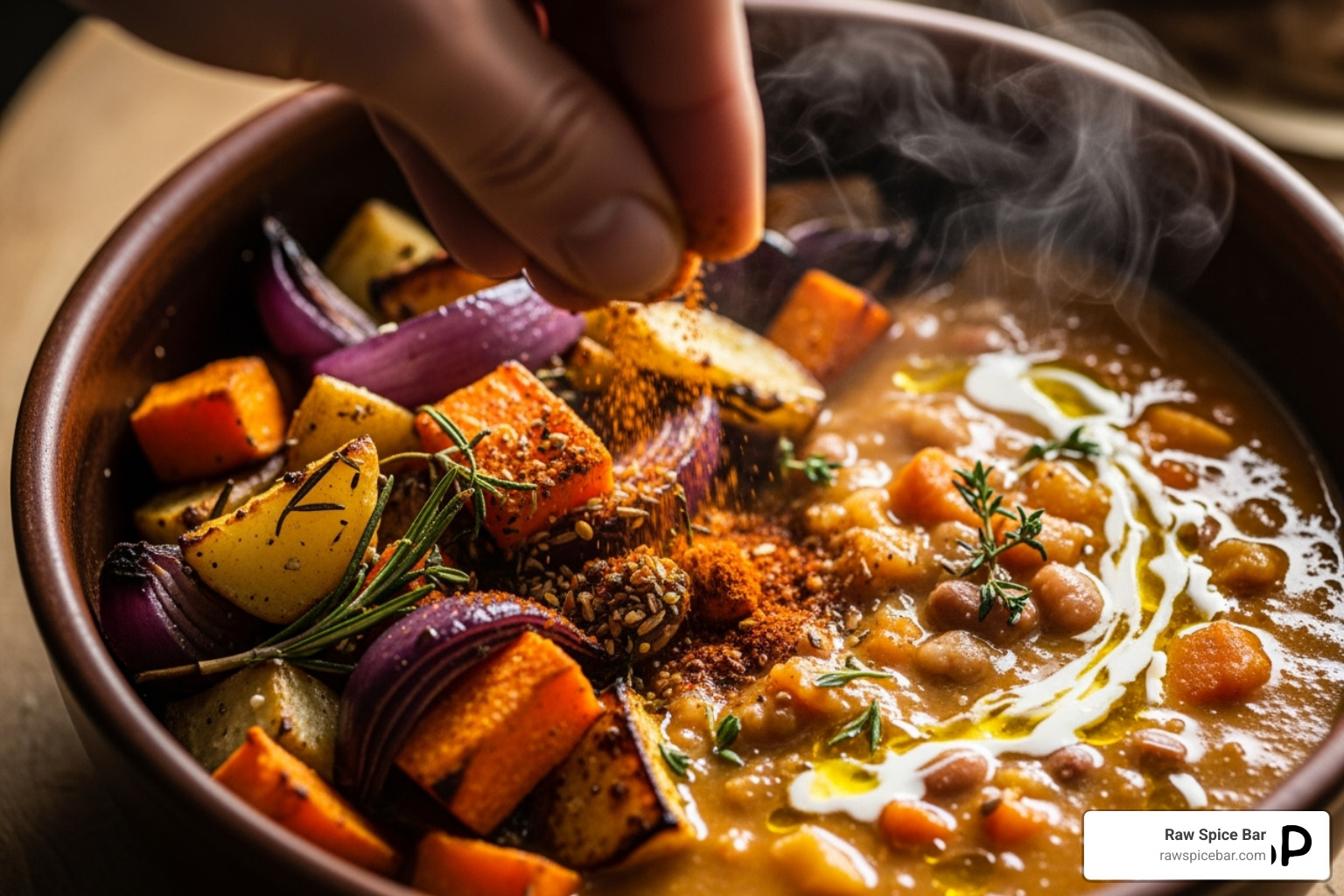
Here are some creative ways to use your homemade poultry seasoning (or its substitutes):
- Stuffing and Dressing: This is perhaps the most classic use beyond the bird itself. Poultry seasoning is essential for that comforting, herbaceous flavor in your Thanksgiving stuffing or dressing.
- Gravy: Whisk a teaspoon or two into your homemade gravy for an extra layer of savory depth.
- Soups and Stews: Add a generous sprinkle to chicken noodle soup, hearty stews, or even a simple vegetable broth. It brings a "homestyle" warmth to any brothy dish.
- Casseroles and Pot Pies: Lift the flavor of your chicken and rice casseroles, creamy pot pies, or savory baked dishes.
- Roasted Vegetables: Toss root vegetables like potatoes, carrots, parsnips, or even Brussels sprouts with olive oil and poultry seasoning before roasting for an incredibly flavorful side dish.
- Pork and Lamb: Don't limit it to fowl! Poultry seasoning is excellent as a rub for pork chops, pork loin, or even lamb.
- Meatloaf and Meatballs: Mix it into your ground meat for a savory boost in meatloaf, meatballs, or even veggie burgers.
- Compound Butter: Blend softened butter with poultry seasoning, a pinch of salt, and some minced garlic. Use this compound butter to spread on dinner rolls, garlic bread, or melt over steamed vegetables.
- Other Savory Dishes: Get creative! Sprinkle it on pizza, stir it into ramen or rice, or use it to flavor vegetarian dishes like crispy baked tofu or tofu scrambles.
Whether you're seasoning a turkey (and for more on that, see How to Season a Turkey), or experimenting with new flavors in your everyday cooking, this blend is your secret weapon.
Frequently Asked Questions about Poultry Seasoning Alternatives
When you're exploring poultry seasoning substitutes, questions naturally come up. I've heard these same questions countless times from fellow home cooks, so let me share the answers that will help you steer your spice cabinet with confidence.
What is the difference between poultry seasoning and chicken bouillon?
This confusion happens more often than you'd think! Poultry seasoning is a dry herb blend made from aromatic herbs like sage, thyme, and rosemary. It's designed to add that classic "Thanksgiving dinner" flavor to your dishes without any actual chicken taste.
Chicken bouillon is a concentrated flavor base, often salty and containing dehydrated chicken stock. It comes in cubes, granules, or paste form and is meant to add rich, meaty chicken flavor to soups and stews.
Here's the key point: they are not interchangeable in recipes. If you tried using bouillon instead of your best poultry seasoning substitute, you'd end up with an overly salty, chicken-flavored disaster instead of the herbaceous, earthy notes you're after.
Can I use fresh herbs instead of dried for a poultry seasoning substitute?
Absolutely! Fresh herbs can bring a bright, vibrant flavor that really makes your dishes pop. The trick is getting the proportions right.
The general rule is to use three times the amount of fresh herbs as dried. So if your recipe calls for 1 teaspoon of dried sage, you'd use 3 teaspoons of fresh sage instead.
When working with fresh herbs, chop them finely to ensure they distribute evenly throughout your dish. Fresh herb substitutes work best for rubs and marinades where their natural moisture can be absorbed into the meat. They're particularly wonderful when you're making compound butter or seasoning roasted vegetables.
Why does my homemade seasoning taste bitter?
Nothing's more disappointing than spending time crafting your own blend only to have it taste off. The bitter taste usually comes from one of these culprits.
Old spices are the most common problem. Herbs and spices don't last forever, and as their volatile oils break down, they can develop bitter or musty flavors. Before mixing any blend, taste each individual spice. If they smell weak or taste unpleasant, it's time to replace them.
Improper storage is another major factor. Heat, light, and air are the enemies of fresh spices. Storing your herbs above the stove, in clear containers in direct sunlight, or in jars that aren't properly sealed will cause them to deteriorate quickly.
Always taste individual spices before mixing them into your blend. This simple step can save you from wasting other good ingredients and help you identify which spices need replacing. Fresh, properly stored herbs should smell aromatic and taste clean without any bitter aftertaste.
Conclusion: Never Run Out of Flavor Again
Ever found yourself mid-recipe, rummaging through your spice cabinet, only to find you're out of that essential poultry seasoning? Don't you worry! As we've seen, running out of best poultry seasoning substitute options is no longer a culinary crisis. In fact, it can be a wonderful opportunity to get creative in the kitchen!
Whether you reach for individual herbs like trusty sage, earthy thyme, or aromatic rosemary, or grab a pre-made blend like Italian seasoning or Herbs de Provence, you've got fantastic alternatives at your fingertips. These simple swaps ensure your dishes never miss a beat when it comes to flavor.
But here’s the real secret weapon, the ultimate game-changer for any home cook: crafting your own homemade poultry seasoning. It’s truly the best poultry seasoning substitute because it puts you completely in charge. Think about it: you get to control every single ingredient, ensuring pure, vibrant flavor without any unwanted additives. Plus, it’s incredibly cost-effective – a huge win for your budget!
The magic of homemade seasoning lies in its freshness and your ability to customize it. Love a little more sage? Go for it! Want a hint of warmth from nutmeg or a subtle kick from white pepper? You decide! This control means your dishes will always be perfectly seasoned to your unique taste.
At Raw Spice Bar, we believe that great flavor starts with understanding your ingredients. We're passionate about bringing freshly ground, globally inspired spice blends straight to your kitchen, along with the knowledge you need to use them like a pro. We know that the best flavors come from passionate culinary artists, not just from a factory. So, take control of your flavors, experiment with these amazing substitutes, and get ready to lift every meal you make.
Ready to explore a world of vibrant, fresh flavors?
Explore our freshly ground, globally inspired spice blends
